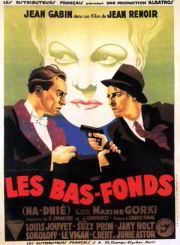 Following our quiet contemplation of Kurosawa’s The Lower Depths in January, our film club will continue its progress and move onto Jean Renoir’s 1936 film of the same (or titled Les Bas-fonds in its original French).
Following our quiet contemplation of Kurosawa’s The Lower Depths in January, our film club will continue its progress and move onto Jean Renoir’s 1936 film of the same (or titled Les Bas-fonds in its original French).
Both works are, of course, based on Maxim Gorky’s play. Yet, the two take very different approaches to the source.
Despite the fact that Kurosawa moves the action to Japan while Renoir at least on the surface keeps it in Russia, Kurosawa’s film follows the original play much more closely. Renoir takes many liberties with both the plot and the characters, and much of the first half of the film is in fact not even spent at the lower depths of the boarding house, but in high society.
Similarly, while Kurosawa’s film is a tour de force of ensemble acting, Renoir focuses more on some characters than others, making Pepel (played by the always excellent Jean Gabin) a definite lead character whose story we are following. As a result, the two works are also rhythmically very different, with Kurosawa following Gorky’s almost plotless procession, while Renoir is able to make use of a more standard narrative plot progression. And while with both Gorky and Kurosawa one can validly question whether there is any way out of the empty illusions and dreams of those stuck in the lower depths, Renoir provides the possibility and a concrete example of redemption.
The difference between the two approaches may well have something to do with the origins of the two films. While Kurosawa admired Gorky’s play and other Russian literature of the era, according to the Alexander Sesonske’s essay published with the Criterion edition of the film, and also available on Criterion’s website, Renoir’s adaptation of The Lower Depths had its origins in the European political landscape of the 1930s, with the rise of Nazism in Germany and that of the Popular Front in France. This difference is visible also when comparing the two films, as Kurosawa’s Lower Depths tackles the story with the theme of human condition in mind, whereas Renoir’s Lower Depths is arguably more restricted to sociological questions.
Kurosawa greatly admired Renoir, both as a director and a human being. In the preface to his autobiography, Kurosawa mentions Renoir’s own autobiography as the main reason he finally decided to write one himself. He also mentions the time the two directors met, which left Kurosawa with “the feeling that I would like to grow old in the same way [Renoir] did” (xii).
Teruyo Nogami, in her book Waiting on the Weather, also describes this meeting that according to her took place in Paris. She specifically mentions that Kurosawa had been particularly eager to discuss Gorky and The Lower Depths with Renoir, only to have the French director tell him that the French film “is not The Lower Depths. It is completely different from the original work.” (281)
One reason for Renoir’s hesitation to discuss The Lower Depths may have been that he had not in fact at that point yet seen Kurosawa’s adaptation. According to Sesonske’s essay (which actually suggests that the above meeting took place in Los Angeles in Spring 1976), Renoir ultimately saw Kurosawa’s film in 1977. “He watched it with great interest, then remarked, ‘That is a much more important film than mine.'”
Would you agree with Renoir’s assessment and why?
Renoir’s The Lower Depths is available in a Region 1 DVD from Criterion, which also includes Kurosawa’s film.
Our film club’s target next month will be Kurosawa’s 1958 work The Hidden Fortress. For home video availability, see Kurosawa DVDs.






A very enjoyable film! I’ve just finished watching it now.
I’m amazed at just how different it is from Kurosawas version. The whole first act of course is entirely new. Renoir clearly did everything he could to make it into pure cinema – I doubt anyone unaware of its background would guess its theatrical origins. Yet ironically, I think Kurosawa, in embracing its theatricality, actually made a better film.
Renoirs version is clearly much funnier and more light-hearted. I think this creates a somewhat awkward tension with the downbeat and tragic elements of the original story. He almost pulls it off, but not quite I think. Jean Gabin and Louis Jouvet are fantastic in the lead roles, they make the film. But oh…. Jany Holt as Nastasia, what a terrible performance! She creates a giant black hole everytime she’s on screen. On the screen notes of my Criterion version it says Renoir was told to cast her by the producer, and did everything he could to improve her performance, but he is quoted as saying she just didn’t have the face or the acting ability. However, according to imdb, she seems to have had quite a long and fairly distinguished career, so I wonder if Renoir has to take some of the blame. Its a pretty serious problem in the film, as its very hard to see why Pepel or the Inspector would be so interested in her.